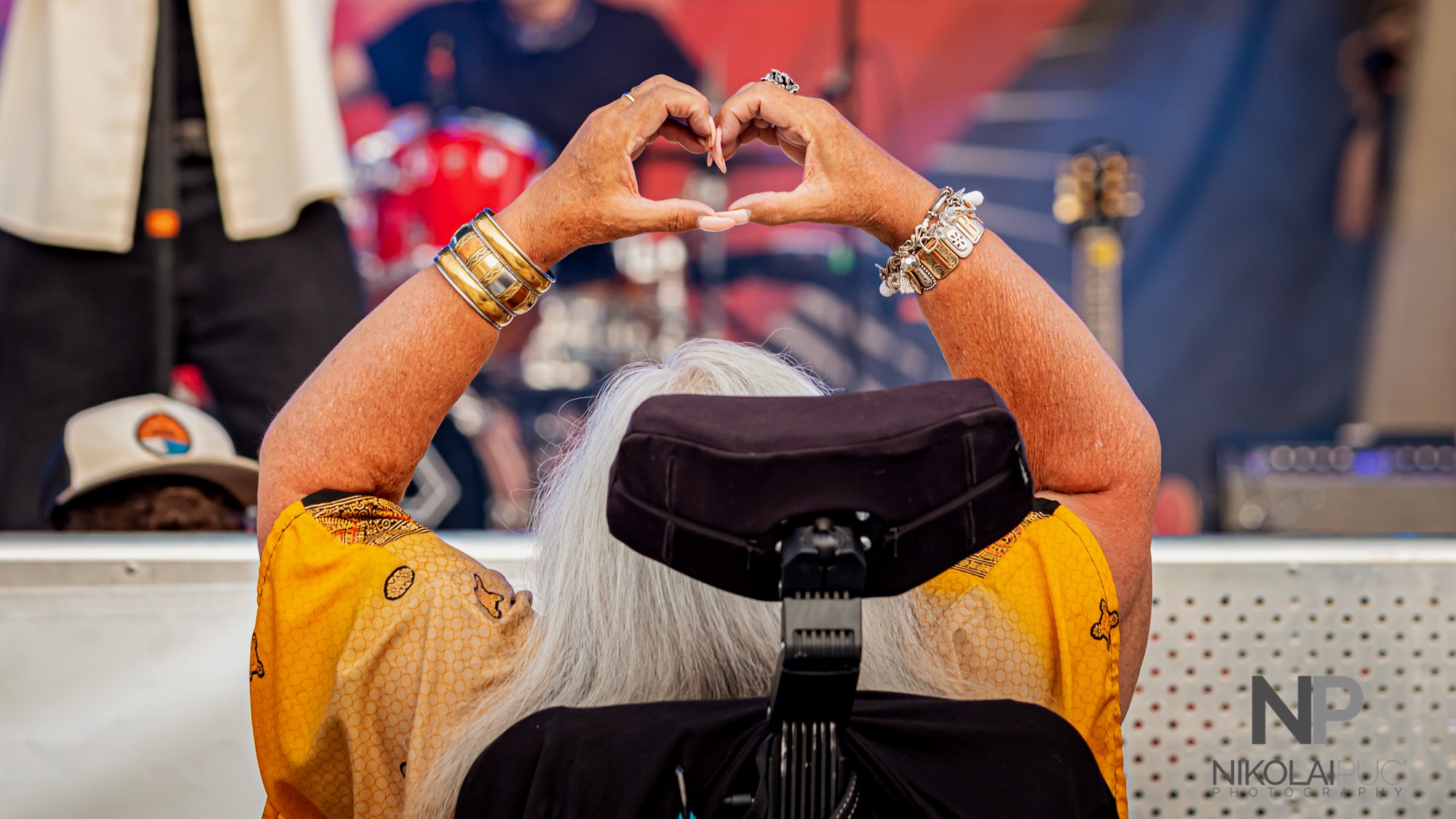
In August, the Shine Music Festival—billed as a “booty shaking, progress making, radically accessible music event”—brought hundreds of concertgoers of all ages, backgrounds and abilities to Levitt Pavilion Denver’s expansive lawn to experience the healing power of music. Today we’re taking a closer look at this historic daylong celebration three years in the making and exploring some of the ways permanent Levitt venues across the country are working to improve the live music experience for people of all abilities.
A ‘radically-accessible’ music festival
Little did six-year-old Lacie and guitar-playing street performer Cliff Woodage know that their spontaneous jam session on the streets of Grimsby, England, would one day inspire a day of music, community and access across the Atlantic Ocean. When Shine Music Founder and ‘Inclusion Architect’ Shawn Satterfield stumbled across a 2018 YouTube video of Lacie, who is blind and autistic, hearing Woodage’s music on the street, Satterfield was struck by the young girl’s elated smile. “I know that smile” said Satterfield, “that’s the feeling I get when I’m at live music.” Time and again Satterfield had experienced live music’s ability to bring people together and create a palpable joy amongst artists and concertgoers alike. Reflecting on the barriers that often prevent people living with disabilities from experiencing that collective joy, Evergreen, Colo.-based Satterfield set to work bringing the Shine Music Festival to life—where people of all abilities could feel the shared joy of free, live music.
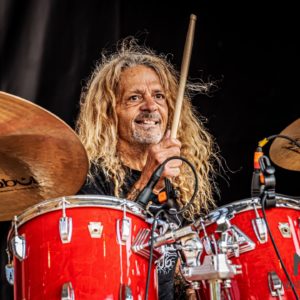
Michael Jochum of Ryan Chrys & The Rough Cuts (photo by Nikolai Puc’ Photography via Shine Music Festival)
The August 8, 2021, event at Levitt Pavilion Denver attracted an exciting and eclectic lineup of 11 bands presented across two stages. “Honestly, [the musicians and bands] picked us. As musicians found out about the Shine Music Festival, they reached out to us telling their stories of why this means something to them and asked to participate,” said Satterfield in an interview with 303 Magazine. Upon reading the event’s description, Graham Good of Graham Good & The Painters thought, “Wow, this sounds like something that this band needs to be a part of” he shared in a recent interview. He went on to explain how “every song that you play live for people has the ability to enhance their life,” recognizing the potential impact his band’s music could have on Shine attendees. For Michael Jochum of Ryan Chrys & The Rough Cuts, it was all about connection. “Everybody wants to be able to connect,” he explained in a recent interview, “and the opportunity to connect is everything.”
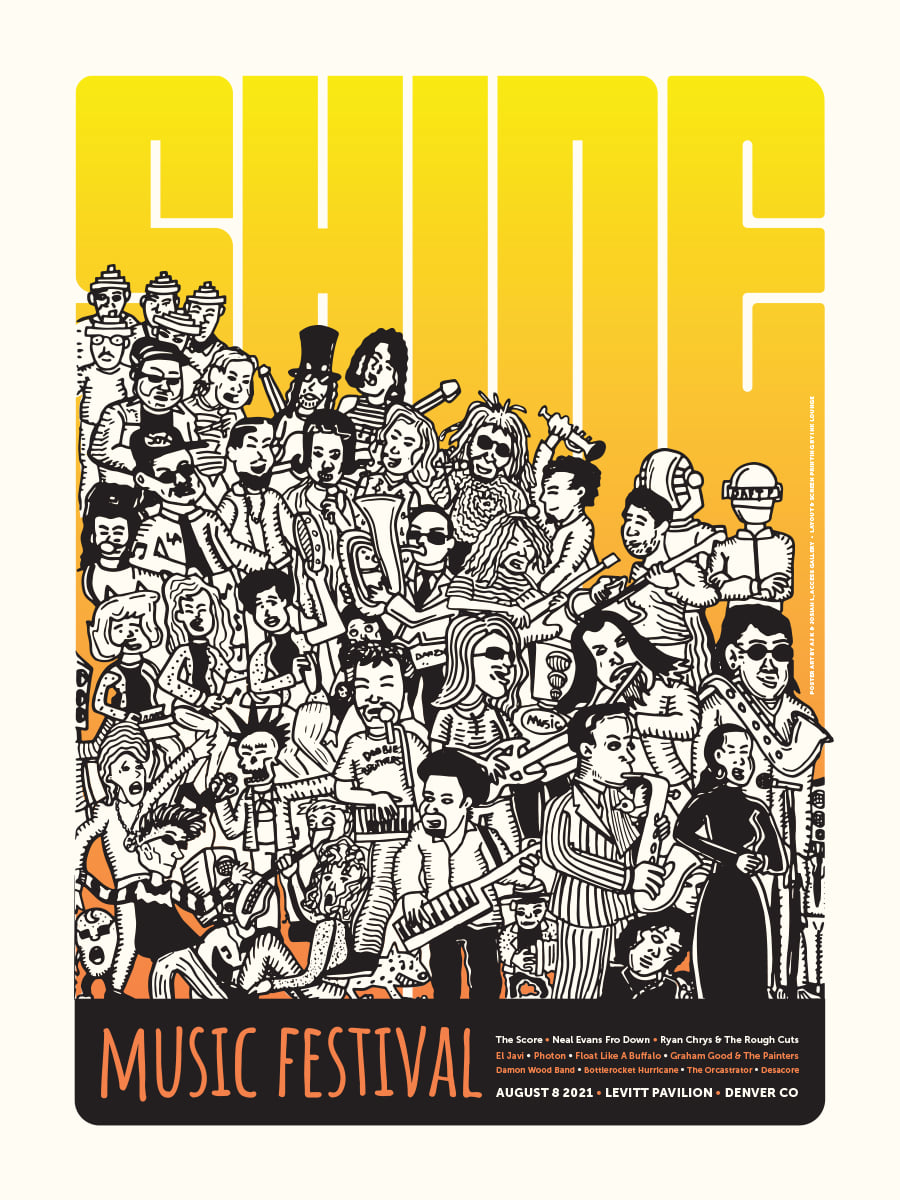
2021 Shine Music Festival poster (poster art by AJ K. and Access Gallery and layout by Ink Lounge via Shine Music Festival)
To help Shine Music Festival attendees connect with the music onstage—regardless of their ability to hear and/or see the performers—ASL interpreters and groundbreaking adaptive technology were brought onsite. Full Body Sound demoed their immersive wearable tech, a handheld device that receives audio and outputs tactile audio stimulation, allowing users to enjoy a full body surround sound experience and feel the music being played. And Feel the Beat invited attendees to do just that, to feel performers’ vibrational energies through a state-of-the-art bone conduction dance floor for the hard of hearing. All concertgoers enjoyed a festival-like atmosphere, centered around accessibility.
Setting the visual tone was a stunning festival poster illustrated by AJ K. of Access Gallery. Lively colors could be seen across the lawn as well, where color-coded pathways corresponded to grade steepness to show the easiest and safest routes for people with different levels of mobility. From food vendors with Braille menus to accessibility-centered booths featuring organizations like Rehabilitative Rhythms, Art from Ashes and Special Olympics Colorado, there were plenty of services and products to explore. Attendees could also enjoy a designated neurodiversity area, featuring the Autism Community Store’s Sensory Bus, where attendees experiencing sensory challenges could shelter if they needed relief from the music festival’s atmosphere.
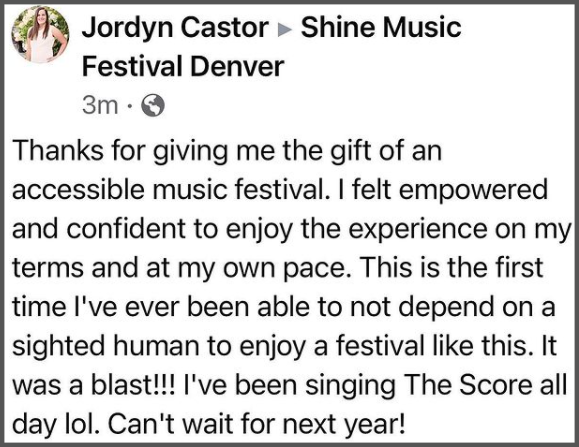 Appreciation ran especially deep for concertgoers like Jordyn Castor, who shared the following on the event’s Facebook page:
Appreciation ran especially deep for concertgoers like Jordyn Castor, who shared the following on the event’s Facebook page:
“Thanks for giving me the gift of an accessible music festival. I felt empowered and confident to enjoy the experience on my terms and at my own pace. This is the first time I’ve ever been able to not depend on a sighted human to enjoy a festival like this. It was a blast!”
Building more inclusive experiences across the Levitt network
While the Shine Music Festival was produced by Satterfield’s nonprofit, Shine Music, during the past several years Levitt Denver has partnered with community organizations serving people of all abilities, including the Wayfaring Band, which provides travel experiences for adults who experience intellectual and developmental disabilities; Pass the Bass, a campaign to spread awareness about brain injuries; and Phamily Theatre Company, Colorado’s award-winning creative home for theatre artists with disabilities. Like Satterfield, Thomas has witnessed that all too often, concertgoers living with disabilities don’t always have the freedom to enjoy the full concert experience. “Our hope is that Levitt Pavilion Denver can be a space where people of all abilities have that freedom,” said Thomas.
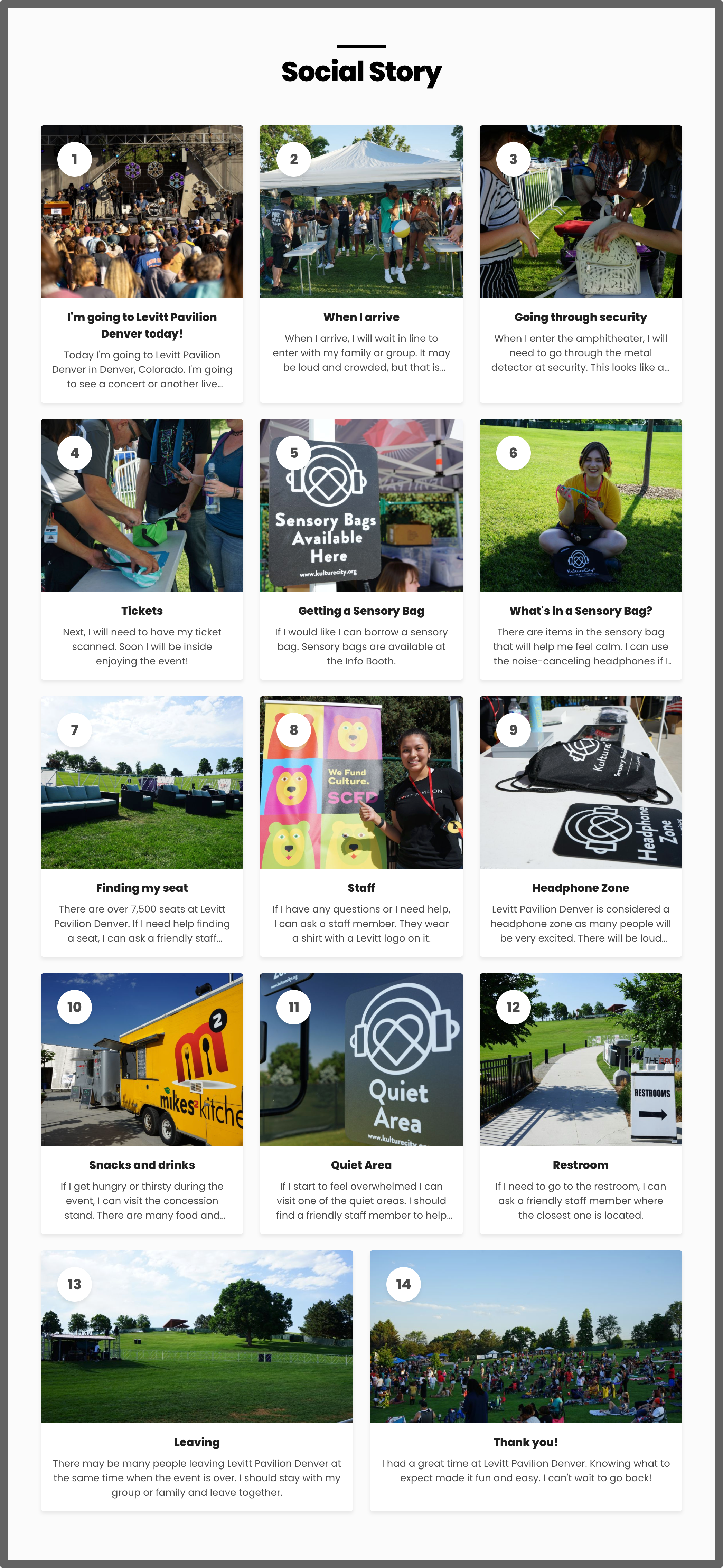
Levitt Denver’s step-by-step guide to attending a free Levitt concert, powered by KultureCity.
Levitt Denver’s physical structure includes ADA-compliant ramps for concertgoers and artists with mobility devices, and earlier this year the venue became a KultureCity Certified Sensory Inclusive Venue. Levitt Denver committed to this certification to better support visitors with sensory concerns and provide valuable on-site resources like signage, sensory bags with headphones and lap pads to help concertgoers feel calm, and a dedicated space for anyone who needs a break from the lively concert atmosphere. As part of the KultureCity certification process, the venue has joined the KultureCity app. The app provides prospective concertgoers a step-by-step guide to what it’s like to attend a show at Levitt Denver—a service that allows individuals of all abilities to plan their visit. Thomas explained the importance of creating an environment where “the person who has the most accessibility concerns can feel safe and access the venue the way you want,” he said.
Over in Memphis, Levitt Shell received the KultureCity certification as well 2019. According to Executive Director Natalie Wilson, “The Levitt Shell is committed to inclusivity and accessibility on AND off our historic stage…This initiative promotes an accommodating and positive experience for all guests and fans with a sensory issue who visit the Levitt Shell.”
Up in Bethlehem, Pa., on the historic ArtsQuest campus, Levitt Pavilion SteelStacks is partnering with Accessible Festivals for several 2022 concerts to help concertgoers enjoy the live music experience on their terms, regardless of ability. This partnership comes on the heels of Accessible Festivals hosting ‘The Inclusion Zone’—a safe, sensory-supportive space that provided services, tools and amenities for concertgoers with sensory-processing difficulties—at ArtsQuest’s annual music festival, Musikfest. As Levitt Pavilion SteelStacks Executive Director Anne Sturm shared, she and her team “continue to work towards diversity and inclusion in everything [they] do.”
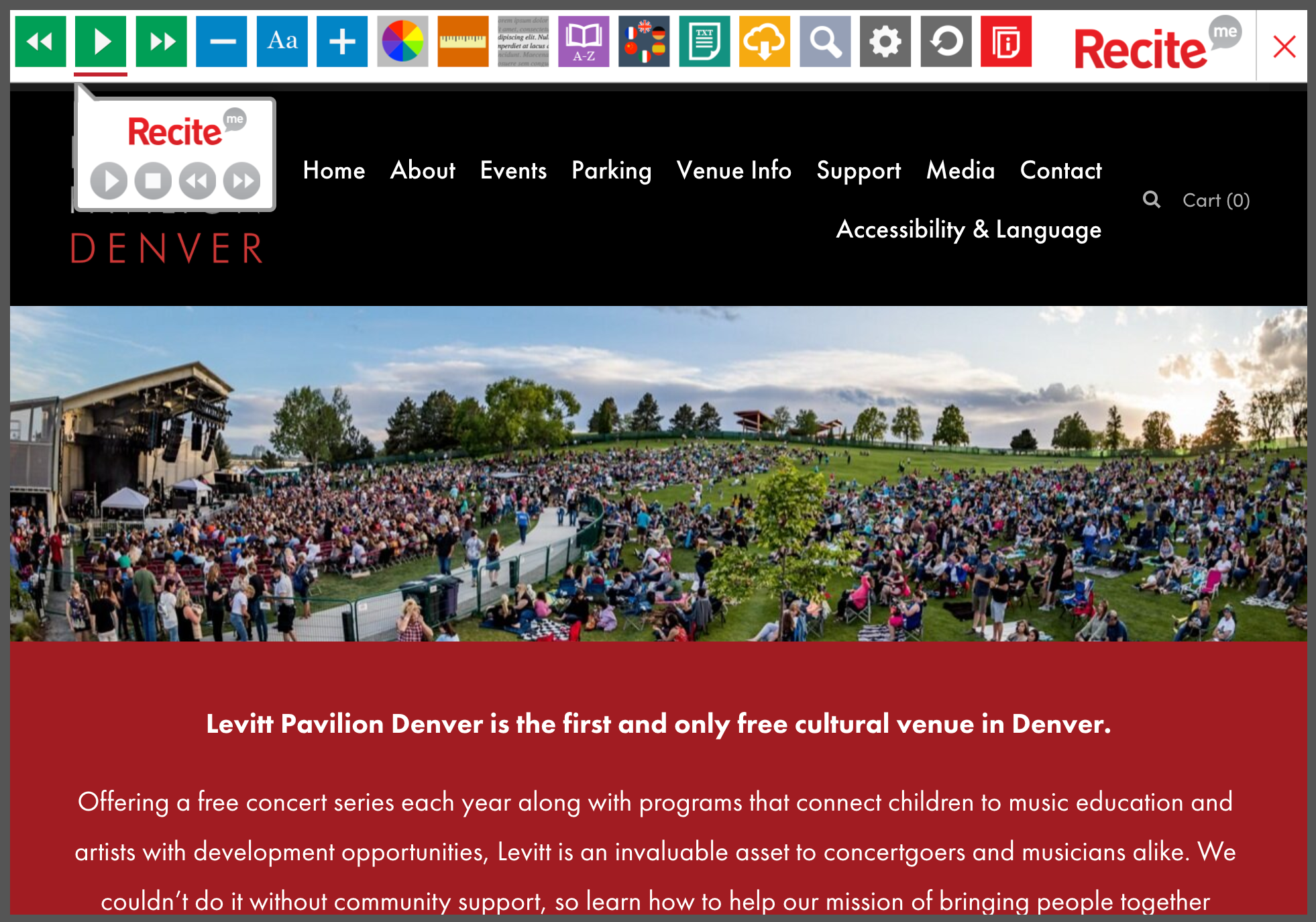
Recite Me toolbar on the Levitt Denver website.
Across the Levitt network, nonprofits are working to create accessible experiences in person and in the digital space. The Levitt Foundation and permanent Levitt venues in Arlington, Dayton, Denver, Memphis, and Sioux Falls have implemented interactive accessibility toolbars to remove online barriers for those with disabilities, learning difficulties and visual impairments, and those who’d prefer to view the site in a different language. The assistive toolbar provides users with a range of features including screen reading functionality, multiple reading aids, customizable styling options, and an on-demand live translation feature that boasts over 100 languages including 35 text-to-speech and styling options. Regarding this commitment to web inclusivity, Thomas said, “Making our website a more accessible space reflects our overall mission and is an important step in making our resources available to all Coloradans.” He added, “Having a tool like Recite Me is just another way of letting all the members of our diverse community know that they are welcome at Levitt Pavilion Denver.”
Listening is Key
“I hope you leave here being more inclusive in your thinking,” Satterfield shared from the Levitt Denver stage at the close of the Shine Music Festival. She went on to explain that she hoped the day inspired people to be more inclusive in their plans, buildings, architecture and music.
With one in four adult Americans—61 million people—living with disabilities, the need for inclusive live music experiences is of paramount importance. Satterfield expressed a common adage in the disability community, “Nothing for us that’s not with us,” an important reminder that representation goes beyond programming or communications. It begins with planning and decision-making, sharing power and learning along the way. “It’s up to all of us to continue to learn,” echoed Thomas. “There are always things to learn. There are always people to talk to.” For Thomas, the key to increasing accessibility boils down to listening: “All venue owners, promoters and people who produce events, we need to be able to listen because we don’t know as much as someone who is experiencing that day to day….”
Here’s to continuing to learn and listen how to create more inclusive concert experiences, so people of all ages, backgrounds and abilities can experience the power of live music.
